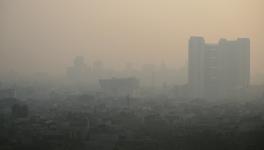COVID-19: CT Scans/X-Rays Should be Used to Rule out False Negatives in Symptomatic People: Experts
New Delhi: Amid a staggering surge in COVID-19 cases, India's top experts on Monday said RT-PCR tests detect coronavirus in around 80% of the cases, so clinical features and CT scans/chest X-rays should be used to rule out false negatives in symptomatic patients followed by a repeat test after 24 hours.
Amid SARS COV-2 'variants of concern' circulating, they said RT-PCR tests do not miss mutations as the ones being used in India target more than two genes.
According to government data till April 15, a total of1,189 samples have tested positive for 'variants of concern' of SARS COV-2 in India which include 1,109 samples with the UK variant, 79 samples with South African variant and one sample with the Brazil variant.
Based on ICMR data, the current variants are also being picked up by the RT-PCR tests. The RT-PCR test has sensitivity of around 80% and therefore 20% of the cases can still be missed out.
"Also, if the sample is not properly taken or if the test is done too early when the viral load is low, it may come out negative. So, if a person is symptomatic, a combination of clinical features, laboratory reports, CT/chest X-ray can be used for presumptive diagnosis of COVID-19 and treatment should be started accordingly. The test should also be repeated after 24 hours," AIIMS Director Dr Randeep Guleria toldPTI.
Dr Samiran Panda, the Head of Epidemiology and Communicable Diseases at the Indian Council of Medical Research (ICMR), said the mutants -- variants from the UK, Brazil and South Africa -- are not able to evade the diagnostic RT-PCR testing that is being conducted in India.
"In India, we have to be able to detect two or more genes of virus so if mutation happens on one area then the RT-PCR test kits will be able to capture it and it is capturing. However, some of the infections will remain undetected irrespective of the mutations happening," Panda said.
Moreover, all the mutants have been identified from these tests only, he said.
Clinical symptoms and CT scan reports should be the guiding factor for treatment rather than relying only on the RT-PCR test which has a sensitivity of around 80%, another senior doctor said.
Even the rapid antigen test has a sensitivity of only 40%, he said, adding, "So many patients will be missed if we rely only upon these tests."
Get the latest reports & analysis with people's perspective on Protests, movements & deep analytical videos, discussions of the current affairs in your Telegram app. Subscribe to NewsClick's Telegram channel & get Real-Time updates on stories, as they get published on our website.
























